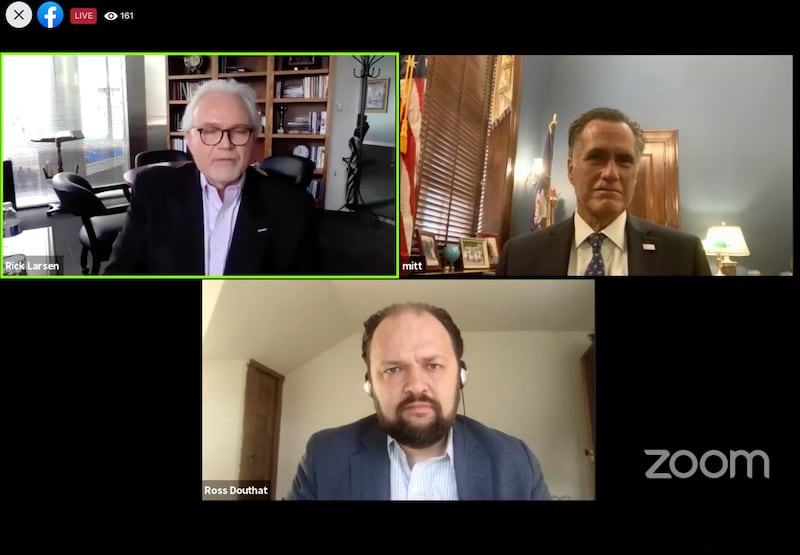Utah Sen. Mitt Romney’s proposal to provide monthly payments to families for children was borne out of his desire to encourage marriage and raise the birth rate in the United States, both of which he says are not going in the right direction.
“That was the concern, people not having kids,” he said. “I believe that family foundation and having children is at the foundation of our nation.”
Americans, he said, are delaying childbirth or having fewer children because of the cost. Many women who decide to have abortions do so because of an inability to care for the child financially, he said.
“Any society, any civilization wants to maintain itself, and we’re not,” the Utah Republican said.
The Sutherland Institute, a conservative public policy think tank in Salt Lake City, held a virtual discussion Tuesday with Romney and New York Times columnist Ross Douthat about the senator’s plan known as the Family Security Act.
The proposal would give a child allowance of $250 a month for school-aged children and $350 a month for those who are younger starting four months before a baby’s due date. The benefit would limit each family to $1,250 a month ($15,000 per year), and would phase out for higher-income families.
Billed as deficit-neutral, Romney proposes paying for it by killing or streamlining existing tax programs and ditching some tax deductions. It would consolidate the child and dependent care credit, head of household filing status, the state and local tax deduction and part of the earned income tax credit. It would eliminate Temporary Assistance for Needy Families and part of the Supplemental Nutrition Assistance Program or food stamps.
Douthat has written favorably about the plan as offering something to the left and to the right. He said it would significantly reduce child poverty, a core left-wing ambition. At the same time, it reduces the current system’s penalties for marriage and its tacit bias against stay-at-home parents, both social-conservative goals.
He said the birthrate in the U.S. has declined the past 20 years, and while many goods have become cheaper, the cost for raising and caring for children has not.
“You have a basic economic problem where not having kids is cheaper than it used to be, and having kids is at least as expensive if not more expensive,” he said. “That’s not the only factor driving down the U.S. birthrate, but it’s the economic component of the problem.”
There is an inarguable negative economic consequence of declining population, Douthat said. A society that is getting older and has fewer young people is going to be less innovative and entrepreneurial, he said.
Douthat said there is a challenge today in how the sexes relate to each other driven by economic and social forces. The internet, he said, has changed dating and social life. In the 1990s, people worried about teenagers and young adults having too much sex and now they’re worried that they’re having too little sex.
“There’s a decline of sex, dating, relationships marriage and kids. It’s a continuum of sort of relational failure. This is something for families, churches, communities. Everybody has to reckon with this. There isn’t a perfect policy solution,” Douthat said.
Romney said there’s only so much politicians can do. But recognizing men and women are saying they want to have more children if they can afford to, he said his plan would give them encouragement and confidence to have a family, and could raise the birthrate at the same time.
“It’s a second best policy to mass conversion to Mormonism, which is unfortunately beyond the purview of the federal government,” Douthat joked.
Romney, a member of The Church of Jesus Christ of Latter-day Saints, replied, “Someone has noted that it is clearly not a plan I worked out with my church because we limit the payments to five children. You don’t get more checks if you go above five children.”
One of the criticisms of Romney’s proposal is that it could be a disincentive to work.
Romney said he’s not looking to eliminate work incentives, but the current system offers no good incentive to have children. A program similar to his proposal in Canada resulted in more single mothers going to work, while married mothers tend to leave the workforce to stay at home with their children, he said.
“I don’t think that’s a negative for society. I don’t want to make that decision for a couple, but I want them to have that decision for themselves,” the senator said.
Douthat said welfare reform in the 1990s successfully moved people off government assistance and back to work. The question is what was the specific mechanism for making that happen.
If receiving less money made them less dependent on government and more likely to go back to work, then there is probably some danger in the cash payments Romney proposes for low-income workers, he said.
Alternatively, it might be that welfare reform got rid of huge benefit cliffs where going to work meant losing all assistance at once, he said. Under that kind of system, there are clearly incentives not to work, he said.
“The senator’s plan doesn’t create that kind of benefit. In fact, it gets rid of some benefit cliffs,” he said.
Romney’s plan has also been criticized as a step toward “universal basic income,” the idea of periodic government payment to people without any work requirement.
“In universal basic income, you get a check for being alive. There’s no behavior which you’re encouraging. There’s no problem you’re looking to overcome in terms of societal choice,” Romney said. “In this case, we’re creating an incentive for people to be able to form families and have children because we’re recognizing that we’re not reproducing ourselves.”
A Sutherland Institute analysis of the Family Security Act concluded that the principle of trust in families, combined with the elimination of marriage penalties and benefit cliffs, seems to make it clear that it would strengthen the institution of the family.
The impacts on work and government are less certain and are an area to consider amendments, but the potential to impact them positively seems to be there, according to Sutherland.
Some conservatives have panned the proposal, but Douthat said there are ways to finesse the legislation to overcome those objections.
Romney said the bill is not cast in concrete and would need to be negotiated by Republicans and Democrats to be successful.
“But I think it’s important for us as conservatives to say we care about family formation, we care about having babies, we care about a pregnant mom who would like to keep a child but can’t afford to and decides to have an abortion,” Romney said.
“My proposal is to make things better on those fronts, imperfect as it is.”


 alt=Dennis Romboy
alt=Dennis Romboy